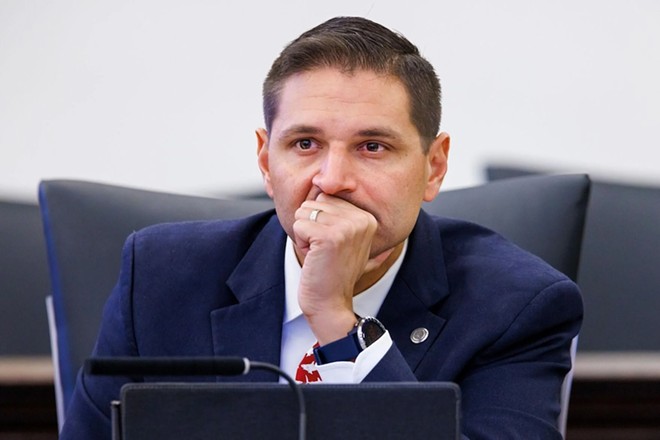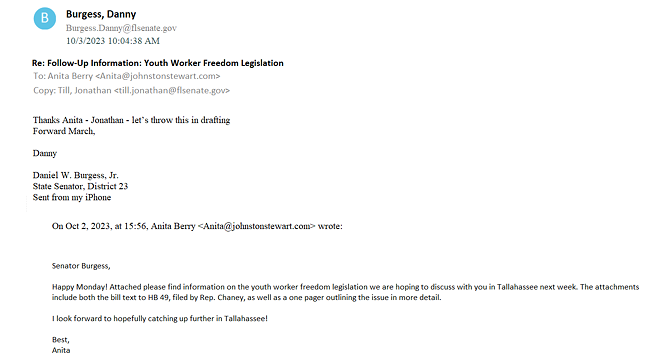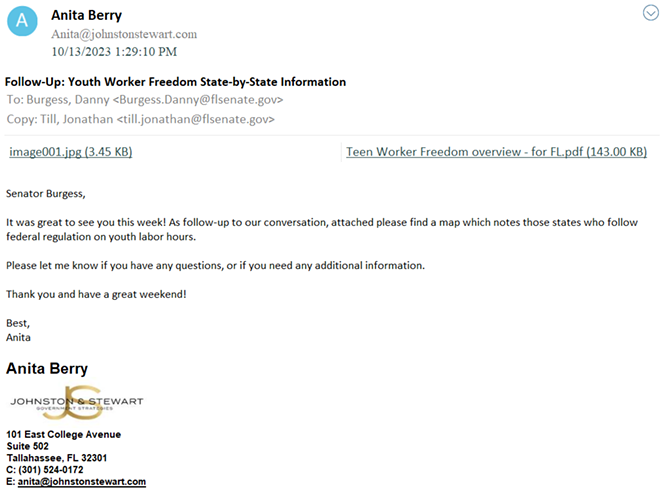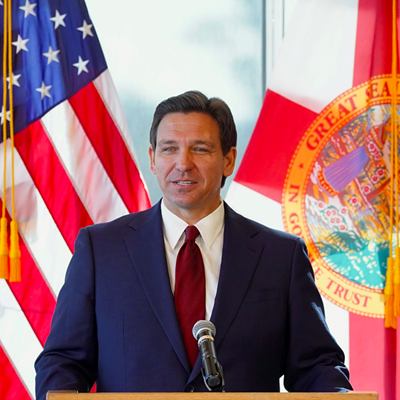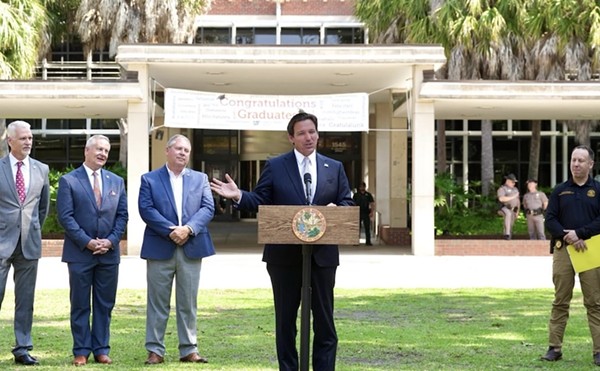Legislation that would weaken child labor protections for minors 16 and older in Florida cleared its first Senate committee on Tuesday in a nearly unanimous vote of approval, despite opposition from members of the public who questioned why it was needed and who exactly it was meant to serve.
The Republican bill sponsor, Sen. Danny Burgess of Zephyrhills, defended Senate Bill 1596 in part by pointing out its differences from similar, hotly debated legislation that’s poised for consideration by the Florida House on Thursday. That bill, House Bill 49, would similarly weaken child labor law by allowing teenagers 16 and older to work more than 30 hours per week during the school year and by gutting breaks currently required for minors every four hours on the job.
The Senate version, sponsored by Burgess, does not allow minors of any age to work more than 30 hours per week while school is in session.
Current law allows children to request a waiver for an exemption and contains additional carve-outs for minors who are employed by their parents, minors who work in homes (e.g., babysitting), minors who work in the entertainment industry, and minors who have already graduated from high school or received their high-school diploma.
Burgess’ proposal would add an additional carve-out for minors who are enrolled in virtual schooling or homeschooling. This provision, later added to the House version as an amendment, hits close to home for Burgess, who is himself the father of young children who are homeschooled.
“They’re too young to work right now, but when they become of age, they may be done with school by 1 p.m,” said Burgess, who briefly served as executive director of the Florida Department of Veterans Affairs before his election to state office in 2020. “They may have an opportunity to go to work, and we want to make sure that we recognize that we live in a world, especially post-COVID, where schedules are a little more fluid, and there’s a lot more opportunity than just the traditional brick-and-mortar.”
Opponents of the bill, however, questioned why the legislation was necessary, since children can already seek partial waivers to be exempted from the law if they want to work longer hours.
“Students are already already able to work, and they are already able to operate outside those regulations through the current waiver process, so why the need for the bill?” asked Dr. Rich Templin, a lobbyist for the Florida AFL-CIO, which represents over 500 local labor unions in the state.
“Florida’s hospitality industry has employment opportunities readily available, and additional labor is much needed,” the FRLA wrote in October. “The industry would be eager to open these opportunities to hardworking 16- and 17-year-old Floridians.”
tweet this
Holly Bullard, chief strategy and development director for the nonpartisan Florida Policy Institute, expressed concern about other legal protections the bill would undermine.
“Extending teens’ work hours and denying them breaks can make even the safest job hazardous,” said Bullard. She explained that this could negatively affect a teenager’s education as well as their well-being, and potentially lead to sleep deprivation if their employer schedules them to work late into the night.
Under the proposed legislation, teenagers 16 and older would legally be allowed to work until midnight on a school night. Current law has a cutoff of 11 p.m. (It's noteworthy that Burgess sponsored legislation back in 2023 changing Florida high school start times to "no earlier than 8:30 a.m.")
Research has found that working more than 20 hours per week can have negative effects on children’s academic performance, and can increase the risk of skipping school and other behavioral problems, like drug use. Young workers are also more likely to be injured on the job.
Burgess, however, blatantly ignored individuals like Bullard who spoke out against his proposed legislation during public testimony, or at least pretended not to listen to what they were saying, instead reading through paperwork as Floridians stood feet away testifying. (Orlando Weekly was not in the committee room, but monitored the hearing on the Florida Channel, a public affairs programming service.)
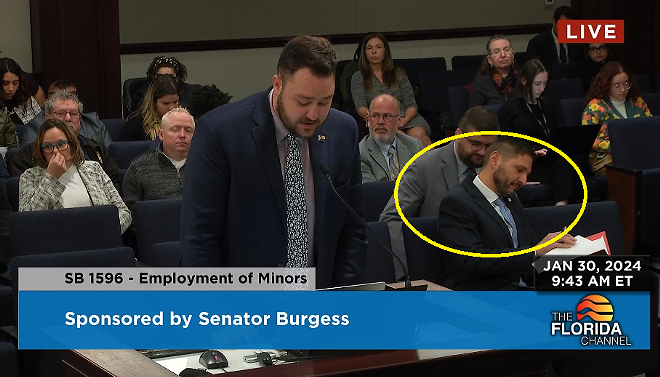
“I want to be very clear: This is not a repeal of Florida’s child labor law,” Burgess told his colleagues at the top. “We took a lot of time and had a lot of hands … cooks in this kitchen to make sure that what we’re doing is responsible.” The idea that he, as a father of three children under 10 years old, would attempt to expose children to exploitation in the workplace, he said, was “insulting.”
Public records originally obtained by the investigative Substack publication Seeking Rents show that bill sponsor Sen. Burgess was asked to file the legislation by a lobbyist for the Foundation for Government Accountability, a conservative think tank based in Naples that has been a driving force behind child labor rollbacks pushed in other states across the country.
Emails show that lobbyist Anita Berry, working on behalf of the FGA’s lobbying arm (the “Opportunity Solutions Project”), emailed Burgess’ office in early October about the legislation, attaching a one-page primer on the companion bill they drafted for the Florida House, filed by Rep. Linda Chaney.
In a follow-up email, after meeting with Burgess, Berry additionally shared a PDF document titled "Teen Worker Freedom," branded with a FGA logo, comparing Florida’s child labor laws to other federal and state laws. Records obtained by the nonprofit organization More Perfect Union show that Berry similarly fed draft legislation with Florida Rep. Linda Chaney, who’s sponsoring the companion legislation in the House.
Child labor violations in Florida and across the country have been on the rise in recent years, according to federal enforcement data. Florida doesn’t have a state labor department to investigate child labor complaints itself. Instead, the state relies on the federal Wage and Hour division and an underfunded state agency that only dedicates seven state employees to the task.
Violations of child labor law in Florida are commonly found in the hospitality and restaurant industries, which have backed the child labor rollbacks proposed this legislative session. The Florida Restaurant & Lodging Association — a trade group representing thousands of employers across the state, including companies like Disney World and Olive Garden — has admitted such revisions to child labor law could help fill labor shortages currently experienced by some of their members.
“Florida’s hospitality industry has career training and employment opportunities readily available, and additional labor is much needed,” the FRLA wrote in a document listing their legislative priorities for 2024, released in October. “The industry would be eager to open these opportunities to hardworking 16- and 17-year-old Floridians.”
Burgess' legislation cleared the six-member Senate Commerce & Tourism committee Tuesday morning in a 4–1 vote along party lines, with Democratic Sen. Linda Stewart voting “No.” Sen. Victor Torres, the only other Democrat on the committee, was absent for the vote.
Subscribe to Orlando Weekly newsletters.
Follow us: Apple News | Google News | NewsBreak | Reddit | Instagram | Facebook | Twitter | or sign up for our RSS Feed

